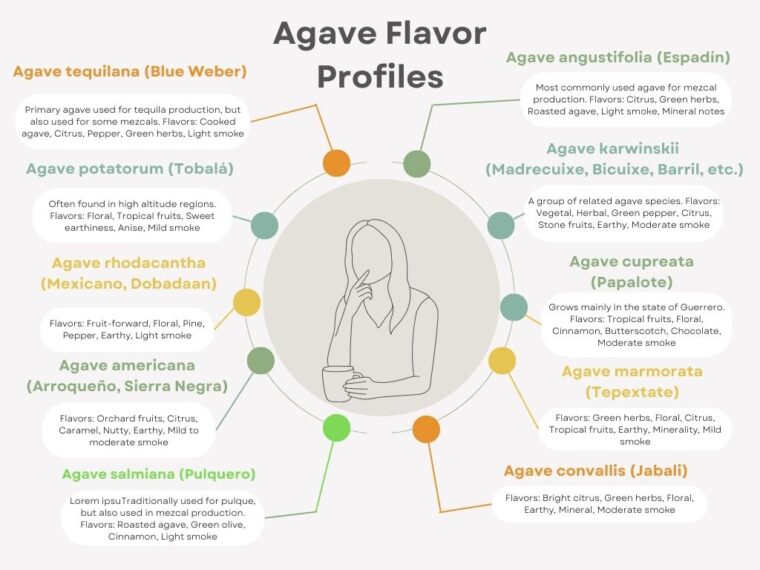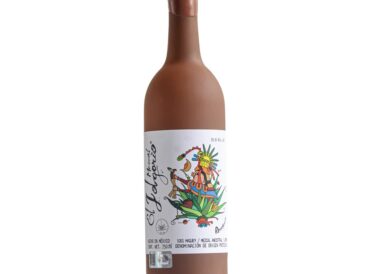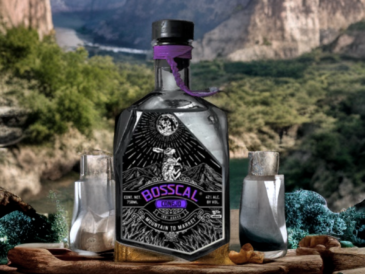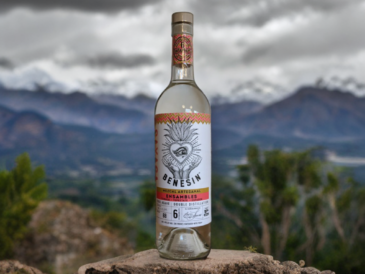Mezcal can be made from various species of agave, each contributing unique flavors and aromas.
Exploring Mezcal Flavor Profiles
Here are some common agave species used in mezcal production and their associated flavors:
- Agave angustifolia (Espadín):
- Most commonly used agave for mezcal production
- Flavors: Citrus, Green herbs, Roasted agave, Light smoke, Mineral notes
- Agave potatorum (Tobalá):
- Often found in high-altitude regions
- Flavors: Floral, Tropical fruits, Sweet earthiness, Anise, Mild smoke
- Agave karwinskii (Madrecuixe, Bicuixe, Barril, etc.):
-
- A group of related agave species
- Flavors: Vegetal, Herbal, Green pepper, Citrus, Stone fruits, Earthy, Moderate smoke
-
- Agave rhodacantha (Mexicano, Dobadaan):
- Flavors: Fruit-forward, Floral, Pine, Pepper, Earthy, Light smoke
- Agave cupreata (Papalote):
- Grows mainly in the state of Guerrero
- Flavors: Tropical fruits, Floral, Cinnamon, Butterscotch, Chocolate, Moderate smoke
- Agave americana (Arroqueño, Sierra Negra):
- Flavors: Orchard fruits, Citrus, Caramel, Nutty, Earthy, Mild to moderate smoke
- Agave tequilana (Blue Weber):
- Primary agave used for tequila production but is also used for some mezcals.
- Flavors: Cooked agave, Citrus, Pepper, Green herbs, Light smoke
- Agave marmorata (Tepextate):
- Flavors: Green herbs, Floral, Citrus, Tropical fruits, Earthy, Minerality, Mild smoke
- Agave salmiana (Pulquero):
- Traditionally used for pulque, but also used in mezcal production
- Flavors: Roasted agave, Green olive, Cinnamon, Light smoke
- Agave convallis (Jabali):
- Flavors: Bright citrus, Green herbs, Floral, Earthy, Mineral, Moderate smoke
Please note that terroir, production methods, and aging factors can influence the flavors and aromas associated with each agave species. Consequently, the flavors mentioned here are general guidelines and not strict rules.
Which is the best intro mezcal?
The best introductory mezcal for someone new to this spirit would be smooth, approachable, and showcasing the characteristic flavors of mezcal without being overly smoky or intense. A mezcal made from Agave angustifolia, also known as Espadín, is often recommended for beginners due to its widespread availability and balanced flavor profile.
Here are some suggestions for introductory mezcals:
- Del Maguey Vida Mezcal:
- Made from Espadín agave
- Approachable and affordable
- Flavors: Citrus, roasted agave, light smoke, and a hint of sweetness
- Montelobos Mezcal Joven:
- Made from Tobalá agave
- Smooth and well-balanced
- Flavors: Green herbs, citrus, roasted agave, and moderate smoke
- Ilegal Mezcal Joven:
- Made from Espadín agave
- Unaged, offering a pure agave flavor
- Flavors: Light smoke, cooked agave, tropical fruits, and a hint of pepper.
Remember that taste is subjective, and your best introductory mezcal might differ from someone else’s preference. Start with one of these suggestions and explore other mezcals as you become more familiar with the spirit.
Which is the best intro tequila?
When it comes to introductory tequila, it’s best to choose a smooth, approachable, and high-quality tequila made from 100% blue agave. This ensures you get a genuine tequila experience without being overwhelmed by harsh flavors. Generally, Blanco (unaged) or reposado (aged in oak barrels for 2 to 12 months) tequilas are recommended for beginners due to their relatively mild and balanced flavor profiles.
Here are some suggestions for introductory tequilas:
-
- 100% blue agave
- Unaged, showcasing the pure agave flavor
- Flavors: Cooked agave, sweet tropical fruits, and a hint of pepper
-
- 100% blue agave
- Aged for several months in oak barrels
- Flavors: Vanilla, caramel, cooked agave, and a hint of oak
Start with one of these suggestions and explore other tequilas as you become more familiar with the spirit. As you develop your palate, you may also want to try añejo and extra añejo tequilas, which have been aged for longer periods and offer more complex flavors.




